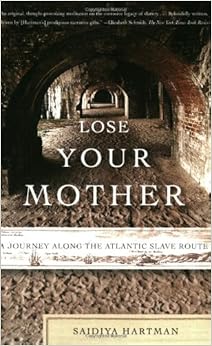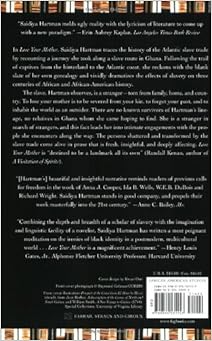From Publishers Weekly
Starred Review. In this rousing narrative, Berkeley professor Hartman traces first-hand the progress of her ancestors-forced migrants from the Gold Coast-in order to illuminate the history of the Atlantic slave trade. Chronicling her time in Ghana following the overland slave route from the hinterland to the Atlantic, Hartman admits early on to a naïve search for her identity: "Secretly I wanted to belong somewhere or, at least, I wanted a convenient explanation of why I felt like a stranger." Fortunately, Hartman eschews the simplification of such a quest, finding that Africa's American expatriates often find themselves more lost than when they started. Instead, Hartman channels her longing into facing tough questions, nagging self-doubt and the horrors of the Middle Passage in a fascinating, beautifully told history of those millions whose own histories were revoked in "the process by which lives were destroyed and slaves born." Shifting between past and present, Hartman also considers the "afterlife of slavery," revealing Africa-and, through her transitive experience, America-as yet unhealed by de-colonization and abolition, but showing signs of hope. Hartman's mix of history and memoir has the feel of a good novel, told with charm and passion, and should reach out to anyone contemplating the meaning of identity, belonging and homeland.
Copyright © Reed Business Information, a division of Reed Elsevier Inc. All rights reserved.
--This text refers to an out of print or unavailable edition of this title.
Hartman journeys along the route taken by captured slaves from the interior of what is now Ghana to the Atlantic coast. With no specific trail to follow from her own lineage, Hartman views her search as a coming to terms with her status as stranger and wanderer in the African diaspora. She meets African American expatriates who have been living in Ghana for 20 years, not fully integrated in Africa but alienated from America. She also meets Ghanians who deride or exploit the desperate longing they see in the throngs of black Americans who visit the slave castles each year. She explores the perspective on slaves and slavery held by Africans versus the African American view and how those perspectives affect diasporan efforts to reconnect and to reckon with history. Reflecting on the complex history of slavery, Hartman integrates memories of her own family's journey to become African Americans from the Middle Passage through the Caribbean to the U.S. An eloquent and thoughtful look at the Atlantic slave trade and its resounding impact on the African American psyche.
Vanessa BushCopyright © American Library Association. All rights reserved
--This text refers to an out of print or unavailable edition of this title.







